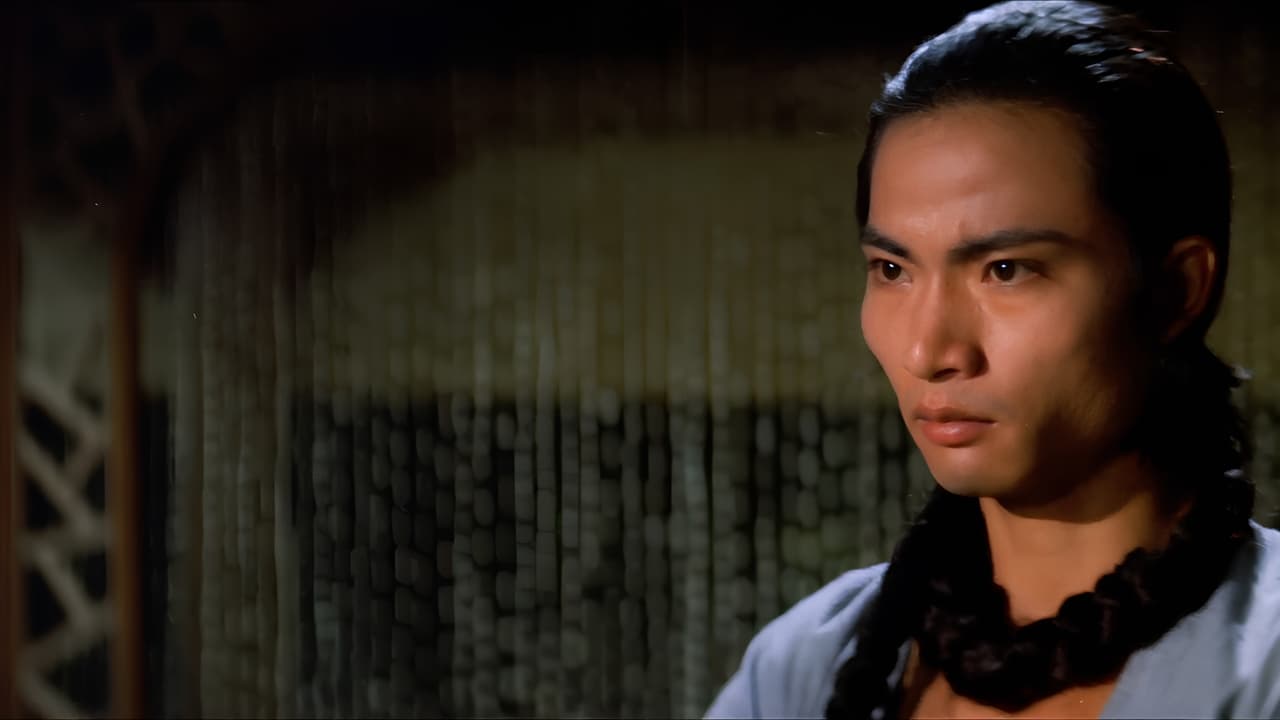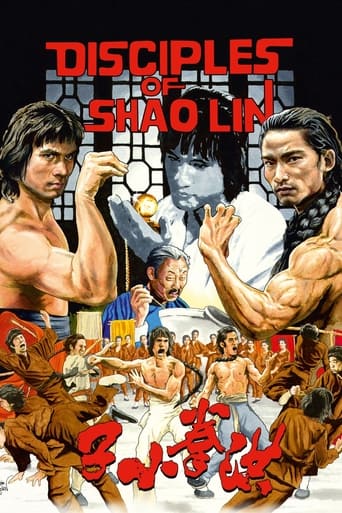

Kuan Fung Yi (Alexander Fu Sheng) is a hot-headed mill worker who wants more out of life than a dawn to dusk shift... You know, some of those little perks the 1% enjoy- like shoes... Take it from a former factory worker: it's dehumanizing; one is little more than a cog in a machine (a replaceable cog, as the owners never tire of pointing out to workers). Fung's death is shown in black and white- no doubt to appease the censors at the time of the movie's release (and, not unlike the red-tinted sequences in Chang Che's HEROES TWO, these scenes feel oddly out of place). Just how disinterested is his boss in Fung's welfare? When he's told that Fung has died, the boss rushes to check on his fighting cricket (which he had named after Fung). Let that be a lesson to anyone who thinks the 1% really care.
... View MoreThe Shaw Bros. studio made between 3.6 and 4.35 trillion films during the "golden age" of Kung Fu cinema. Technically speaking, that's a lot. Do you need to see them all? Probably not... in fact, as with any other genre, there are plenty of klunkers that no one's ever heard of and that you should probably avoid, at all costs. One-offs. Weird ones. Among the more recommended titles, though, among the classics that are so good they deserve multiple viewings, you'll start to see familiar faces and recognizable story lines repeatedly pop up. And, depending on the production period, familiar fighting styles too.If you watch more than a handful of these films certain titles like Disciples of Shaolin will stand out even more as films of mighty significance. Disciples not only stars the immensely popular Alexander Fu Sheng, but it's also one of the last collaborations between director Chang Cheh and star choreographer (and accomplished Kung Fu film director in his own right) Lau Kar Leung, whose Southern Shaolin Hung Fist fighting style dominated many Shaw Bros. films in the mid 70's. Disciples of Shaolin shows off Fu Sheng's impressive ability to fight with real well personality, well-developed characterization and truckloads of charisma, and it just happens to also be a classic, archetypal display of some of the best hand-to-hand Kung Fu you'll see in a mid-70's Shaw Bros. flick.The storyline is all familiar Kung Fu stuff: Guan (Fu Sheng), a young, naive, happy-go-lucky country boy with no shoes (who happens to be an unstoppable Kung Fu master (of course)), moves in with his older, wiser brother, a humble worker at the top textile factory in the big city. But the textile industry in this town is cut-throat... a rival firm owned by the evil Ha Ha Bu starts poaching staff from the top firm, and many fights break out (If you're looking for work in textiles, it really helps if you know Kung Fu). The story definitely plods forward in predictable fashion, but the unique thing here is how stylishly it does so. Much care is given to underscore this clichéed country-mouse tale with motifs representing class struggle and status: Guan, hoping to make it in the big city thinks he's got it made when he finally earns a new pair of shoes. But as he climbs the corporate ladder (using his unstoppable Kung Fu style) he's rewarded beyond his wildest dreams by his corrupt boss. The shoes and later, a gold watch, symbols of Guan's increasingly cumbersome success, effectively give the story a rich-ish texture you don't often see in these movies. Even the corrupt boss, completely out of touch with his workers, lovingly keeps pet crickets, which he cares about more than those who fight and die in the name of his textile business. It's such a nice, subtle bit of characterization that does a huge service to the overall story, and makes it seem like it's actually about something other than world class Kung Fu fighting.Before becoming a huge star, Alexander Fu Sheng trained with Lau Kar Leung for 6 months, and they then made a bunch of movies working closely together. Disciples of Shaolin, if nothing else, serves as a document of the heights that a great master/student team can reach. Fu Sheng, an instantly likable, undeniably capable leading man is so good at both acting AND fighting, that he's able to do both at the same time. He's skilled enough to expertly pull off Kar Leung's impressive Hung Fist style in such a way that his character, a mischievous, bright-eyed prankster, actually comes through in his fighting. He spends many fights in this film taking on dozens of Ha Ha Bu's goons at once, all the while sporting a sneaky grin. If you're like me, you will that grin'll be contagious. He's an absolute delight to watch. It's no surprise that Fu Sheng was as huge a star as he was, as he really does bring something special to the table, and it's on full display in Disciples of Shaolin.This film is awesome and on top of everything else, it's got a kickass 70's soundtrack! I give it a well-deserved four clenched fists out of five.
... View MoreDespite the fact that there really aren't the major set piece fights of the Shaolin movies, this is one of the better Shaw bros flicks. It actually has a point, that can be related to even to this day, of workers being exploited by an unfeeling boss. The owner of the factory the hero works in cares more for his fighting insects than the hero. As the story plays out, however unintentional, we see the Manchu villain cares more for his thugs then the heroes employer cares about his workers. Another good reason to see this particular movie is that it was the late Fu Sheng's favorite role/character. Virtually forgotten, at the time in Hong Kong, Fu Sheng was the biggest star in action movies going. Anyway, for $ 7.99, the VCD or DVD is well worth the price to get a glimpse of the HK James Dean at his best, at least in the acting department. For cool fights, though, you may want to see out "5 shaolin master", "ShaoLin Temple" or "Heroes Two".
... View MoreDespite the title and its inclusion in Chang Cheh's Shaolin series, THE INVINCIBLE ONE (aka DISCIPLES OF SHAOLIN, 1975) has little to do with Shaolin Temple, nor do the main actors, Fu Sheng and Chi Kuan-Chun, play the roles they normally played in the Shaolin films (Fong Si Yu and Hu Wei Chien, respectively). Instead, the film focuses on a poor, wandering kung fu fighter who gets a job in a textile factory and works his way up to become the boss's right hand man, although he alienates his longtime friend (and secret kung fu teacher) who got him the job in the first place.Director Chang Cheh liked rise-and-fall stories (see also BOXER FROM SHANTUNG and CHINATOWN KID) and this one enables him to give a strong, multi-faceted part to his regular star Alexander Fu Sheng in the role of a poverty-stricken villager who, more than anything else, values a good pair of shoes.There are not as many major fights in the film as fans would like, although there are brief skirmishes sprinkled throughout. Fu Sheng really doesn't let loose until the two big fights at the end. The villains are played by Chiang Tao and Fung Hak On, two capable and reliable players, although Fu Sheng deserved a more formidable class of opponent, like the ones he faced in SHAO LIN MARTIAL ARTS, FIVE MASTERS OF DEATH, and SHAOLIN AVENGERS. The major flaw in this film is the absence of co-star Chi Kuan-Chun from any of the fights until the very end.This is a minor entry in the Shaolin series, although it does have an interesting story and gives the superb Fu Sheng a chance to shine as an actor. It was shot in Taiwan and offers a badly patched-together soundtrack of cues ripped off from Italian film scores. In the tape reviewed, scenes of extreme bloodshed in the final fight were printed in black-and-white. The film was remade in Hong Kong in 1993 as THE BAREFOOTED KID.ADDENDUM (4/1/17): I re-watched this film on the R3 DVD edition from Celestial Pictures, the first time I've seen the film in years and the first time I've seen it in widescreen and in its original language (Mandarin) with English subs. In re-reading my original review, I seem to have given short shrift to the film's superbly staged fight scenes. Fu Sheng is excellent in these scenes, on par with the best of his work. While there are long stretches without any action, there are certainly enough fight scenes to satisfy fans of the actor. The fights were all choreographed by Liu Chia Liang (aka Lau Kar Leung), who would later direct Fu Sheng in three films himself, including 8 DIAGRAM POLE FIGHTER (1984), the film Fu Sheng was making when he died in 1983.
... View More